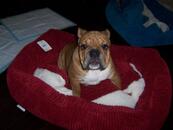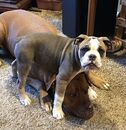How to Treat Kennel Cough
Kennel Cough, or infectious tracheobronchitis, is a highly contagious upper respiratory problem in dogs. In general, kennel cough is a term used to describe a condition called Infectious Tracheobronchitis. The most common types of agents that cause kennel cough are parainfluenza virus, Bordetella bronchiseptica, and mycoplasma. Major contributors are canine adenovirus 2, reovirux and canine herpes virus, but the parainfluenza is the most prevalent.
Steps
1
Know if your dog actually has it. How do you know if the dog actually has the virus? Get a professional diagnosis. Some common symptoms include:
Gagging spells that appear to be choking but is actually coughing.
Vomiting clear fluid which isn't indigestion.
2
Make sure your dog doesn't actually have something stuck in its throat and mistake it for kennel cough. Check by opening the dog's mouth and peering down the esophagus carefully. For safety measures with dogs that are a bit aggressive, consult a vet as soon as possible.
3
Take your dog to the veterinarian. You will see key signs telling you whether your dog is coming down with a secondary sickness. You should keep an eye on your furry friend, making sure that he/she does not become lethargic, stops eating, or has discharge coming from the nose and eyes. You may need to go get medication from your vet. You may get antibiotics such as Azithromycin for the bacterial infection. It is a lot easier for a pup that is 6 months old or younger to get a secondary sickness than those that are older, so it is suggested to not take a chance with your young pup and take him/her to the vet upon signs of kennel cough.
4
The veterinarian may suggest that you help suppress the cough. Ask the veterinarian if giving the dog a spoonful of children's RobitussinDM would be beneficial (about 1 tsp for every 20 pounds of animal weight). Never give human medication to your pet without discussing it with your veterinarian. Administering the wrong dosage or ingesting certain active ingredients in drugs may cause serious health problems.
5
Bring your dog in the bathroom with you while you take a shower (not in the shower), and letting him breathe in the steam can help soothe the cough as well.
6
Boost the dog's immune system. You can also speed up the healing process by giving your dog ground Vitamin C tabs in the water. Wild Berry Bark, Peppermint, Raw Honey, Yerba Santa can be used under a vet supervision.
If your dog is hacking away or constantly making noises that make it sound like he's choking on something, he may have a case of kennel cough, or canine infectious tracheobronchitis. Although kennel cough can sound terrible, most of the time it is not a serious condition, and most dogs will recover without treatment.
What is Kennel Cough?
Just as human colds may be caused by many different viruses, kennel cough itself can have multiple causes. One of the most common culprits is a bacterium called Bordetella bronchiseptica m-- which is why kennel cough is often called Bordetella. Most dogs that become infected with Bordetella are infected with a virus at the same time. These viruses, which are known to make dogs more susceptible to contracting Bordetella infection, include canine adenovirus, canine distemper virus, canine herpes virus, parainfluenza virus and canine reovirus.
Dogs "catch" kennel cough when they inhale bacteria or virus particles into their respiratory tract. This tract is normally lined with a coating of mucus that traps infectious particles, but there are a number of factors that can weaken this protection and make dogs prone to kennel cough infection, which results in inflammation of the larynx (voice box) and trachea (windpipe).
These factors include:
Exposure to crowded and/or poorly ventilated conditions, such as are found in many kennels and shelters
Cold temperatures
Exposure to dust and/or cigarette smoke
Travel-induced stress
Symptoms of Kennel Cough
The classic symptom of kennel cough is a persistent, forceful cough. This is distinct from a cough-like sound made by some dogs, especially little ones, which is called a reverse sneeze. Reverse sneezes can be normal in certain dogs and breeds, and usually only indicates the presence of post-nasal drip or a slight irritation of the throat.
Some dogs with kennel cough may show other symptoms of illness, including sneezing, a runny nose, or eye discharge.
If your dog has kennel cough, he probably will not lose his appetite or have a decreased energy level.
Treating and Preventing Kennel Cough
Kennel cough is contagious. If you think your dog might have the condition, you should keep him away from other animals and contact your veterinarian.
Although most cases of kennel cough will resolve without treatment, medications may speed recovery or minimize symptoms during the course of infection. These include antibiotics that target Bordetella bacteria and cough medicines.
You may also find that keeping your dog in a well-humidified area and using a harness instead of a collar, especially for dogs that strain against a leash, will minimize the coughing.
Most dogs with kennel cough recover completely within three weeks, though it can take up to six weeks in older dogs or those with other medical conditions. Because serious, ongoing kennel cough infection can lead to pneumonia, be sure to follow up with your veterinarian if your dog doesn't improve within the expected amount of time. Also, if your dog at any time has symptoms of rapid breathing, not eating, or listlessness, contact your vet right away, as these could be signs of more serious conditions.
here are some natural remedies, these are not meant to replace antibiotics or vet care, as kennel cough can quickly turn to pneumonia. But these natural remedies will help ease symptoms and keep Fergus more comfortable.
1. Esberitox which is a fast acting Echinacea
2. Vitamin C - a natural anti viral, and Vitamin E - supports immune system
3. Oregano Oil - a natural antiseptic, anti fungal and antibacterial
4. Raw Garlic- but be careful not to give too much, as garlic can be toxic to dogs
5. Raw Honey - will ease coughing and congestion
6. Slippery Elm -
7. Essential Oils - soothes sore throats and to ease breathing, oil of Eucalyptus,
Lavendar Oil, and tea tree oil
8. Chamomile - has a calming effect
I hope this helps you, and that Fergus feels better soon. Sending love, hugs, and prayers for Fergus and you.
Kennel Cough, or infectious tracheobronchitis, is a highly contagious upper respiratory problem in dogs. In general, kennel cough is a term used to describe a condition called Infectious Tracheobronchitis. The most common types of agents that cause kennel cough are parainfluenza virus, Bordetella bronchiseptica, and mycoplasma. Major contributors are canine adenovirus 2, reovirux and canine herpes virus, but the parainfluenza is the most prevalent.
Steps
1
Know if your dog actually has it. How do you know if the dog actually has the virus? Get a professional diagnosis. Some common symptoms include:
Gagging spells that appear to be choking but is actually coughing.
Vomiting clear fluid which isn't indigestion.
2
Make sure your dog doesn't actually have something stuck in its throat and mistake it for kennel cough. Check by opening the dog's mouth and peering down the esophagus carefully. For safety measures with dogs that are a bit aggressive, consult a vet as soon as possible.
3
Take your dog to the veterinarian. You will see key signs telling you whether your dog is coming down with a secondary sickness. You should keep an eye on your furry friend, making sure that he/she does not become lethargic, stops eating, or has discharge coming from the nose and eyes. You may need to go get medication from your vet. You may get antibiotics such as Azithromycin for the bacterial infection. It is a lot easier for a pup that is 6 months old or younger to get a secondary sickness than those that are older, so it is suggested to not take a chance with your young pup and take him/her to the vet upon signs of kennel cough.
4
The veterinarian may suggest that you help suppress the cough. Ask the veterinarian if giving the dog a spoonful of children's RobitussinDM would be beneficial (about 1 tsp for every 20 pounds of animal weight). Never give human medication to your pet without discussing it with your veterinarian. Administering the wrong dosage or ingesting certain active ingredients in drugs may cause serious health problems.
5
Bring your dog in the bathroom with you while you take a shower (not in the shower), and letting him breathe in the steam can help soothe the cough as well.
6
Boost the dog's immune system. You can also speed up the healing process by giving your dog ground Vitamin C tabs in the water. Wild Berry Bark, Peppermint, Raw Honey, Yerba Santa can be used under a vet supervision.
If your dog is hacking away or constantly making noises that make it sound like he's choking on something, he may have a case of kennel cough, or canine infectious tracheobronchitis. Although kennel cough can sound terrible, most of the time it is not a serious condition, and most dogs will recover without treatment.
What is Kennel Cough?
Just as human colds may be caused by many different viruses, kennel cough itself can have multiple causes. One of the most common culprits is a bacterium called Bordetella bronchiseptica m-- which is why kennel cough is often called Bordetella. Most dogs that become infected with Bordetella are infected with a virus at the same time. These viruses, which are known to make dogs more susceptible to contracting Bordetella infection, include canine adenovirus, canine distemper virus, canine herpes virus, parainfluenza virus and canine reovirus.
Dogs "catch" kennel cough when they inhale bacteria or virus particles into their respiratory tract. This tract is normally lined with a coating of mucus that traps infectious particles, but there are a number of factors that can weaken this protection and make dogs prone to kennel cough infection, which results in inflammation of the larynx (voice box) and trachea (windpipe).
These factors include:
Exposure to crowded and/or poorly ventilated conditions, such as are found in many kennels and shelters
Cold temperatures
Exposure to dust and/or cigarette smoke
Travel-induced stress
Symptoms of Kennel Cough
The classic symptom of kennel cough is a persistent, forceful cough. This is distinct from a cough-like sound made by some dogs, especially little ones, which is called a reverse sneeze. Reverse sneezes can be normal in certain dogs and breeds, and usually only indicates the presence of post-nasal drip or a slight irritation of the throat.
Some dogs with kennel cough may show other symptoms of illness, including sneezing, a runny nose, or eye discharge.
If your dog has kennel cough, he probably will not lose his appetite or have a decreased energy level.
Treating and Preventing Kennel Cough
Kennel cough is contagious. If you think your dog might have the condition, you should keep him away from other animals and contact your veterinarian.
Although most cases of kennel cough will resolve without treatment, medications may speed recovery or minimize symptoms during the course of infection. These include antibiotics that target Bordetella bacteria and cough medicines.
You may also find that keeping your dog in a well-humidified area and using a harness instead of a collar, especially for dogs that strain against a leash, will minimize the coughing.
Most dogs with kennel cough recover completely within three weeks, though it can take up to six weeks in older dogs or those with other medical conditions. Because serious, ongoing kennel cough infection can lead to pneumonia, be sure to follow up with your veterinarian if your dog doesn't improve within the expected amount of time. Also, if your dog at any time has symptoms of rapid breathing, not eating, or listlessness, contact your vet right away, as these could be signs of more serious conditions.
here are some natural remedies, these are not meant to replace antibiotics or vet care, as kennel cough can quickly turn to pneumonia. But these natural remedies will help ease symptoms and keep Fergus more comfortable.
1. Esberitox which is a fast acting Echinacea
2. Vitamin C - a natural anti viral, and Vitamin E - supports immune system
3. Oregano Oil - a natural antiseptic, anti fungal and antibacterial
4. Raw Garlic- but be careful not to give too much, as garlic can be toxic to dogs
5. Raw Honey - will ease coughing and congestion
6. Slippery Elm -
7. Essential Oils - soothes sore throats and to ease breathing, oil of Eucalyptus,
Lavendar Oil, and tea tree oil
8. Chamomile - has a calming effect
I hope this helps you, and that Fergus feels better soon. Sending love, hugs, and prayers for Fergus and you.
Last edited:





